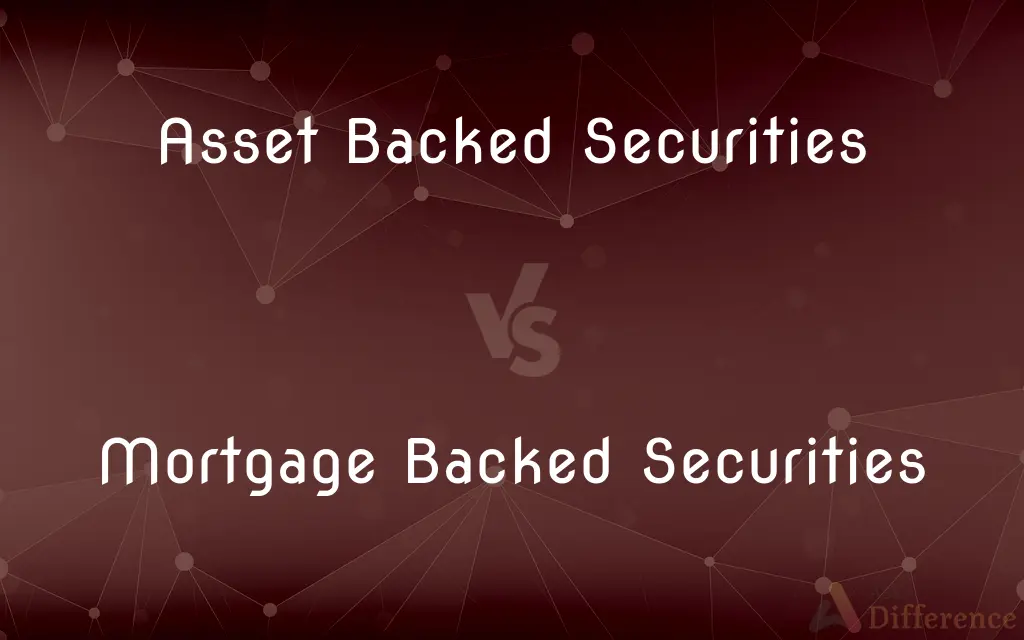Asset Backed Securities vs. Mortgage Backed Securities — What's the Difference?
By Tayyaba Rehman — Published on November 11, 2023
Asset Backed Securities (ABS) are securities backed by various types of assets, while Mortgage Backed Securities (MBS) are specifically backed by mortgage loans.

Difference Between Asset Backed Securities and Mortgage Backed Securities
Table of Contents
ADVERTISEMENT
Key Differences
Asset Backed Securities (ABS) represent a broad category of securities that are backed by a pool of assets, such as auto loans, credit card receivables, or student loans. These assets generate cash flows, which are then used to pay investors. On the other hand, Mortgage Backed Securities (MBS) are a subset of ABS, backed solely by mortgage loans.
While both Asset Backed Securities and Mortgage Backed Securities involve securitizing pools of loans to create tradable securities, the nature of the underlying assets is what sets them apart. ABS can be based on a myriad of asset types, whereas MBS are strictly based on mortgages.
The appeal of Asset Backed Securities lies in their diversification, given that they're backed by various asset types. Mortgage Backed Securities, however, focus on the housing market and are influenced by factors like interest rates and homeowners' mortgage payment behaviors.
Investors looking for exposure to different sectors of the economy might gravitate towards ABS because of the variety of underlying assets. In contrast, those specifically interested in the real estate sector might opt for Mortgage Backed Securities.
Comparison Chart
Definition
Securities backed by a diverse range of assets.
Securities backed solely by mortgage loans.
ADVERTISEMENT
Underlying Assets
Can include auto loans, credit card receivables, student loans, etc.
Exclusively mortgages on residential or commercial properties.
Market Influence
Varied, depending on the type of underlying asset.
Primarily influenced by the housing market and interest rates.
Investor Appeal
Diversification across different asset types.
Exposure to the real estate sector.
Risk Profile
Varies based on the asset type and quality of underlying assets.
Influenced by factors like default rates on mortgages and interest rates.
Compare with Definitions
Asset Backed Securities
Asset Backed Securities encompass various securitized assets.
Asset Backed Securities offer investors a chance to invest in diversified assets.
Mortgage Backed Securities
Mortgage Backed Securities represent ownership in mortgage loans.
When homeowners pay their mortgages, it benefits Mortgage Backed Securities investors.
Asset Backed Securities
Asset Backed Securities derive their value from underlying assets.
The return on Asset Backed Securities depends on the repayment of the pooled assets.
Mortgage Backed Securities
Mortgage Backed Securities are bonds backed by mortgage loan pools.
Mortgage Backed Securities can be affected by shifts in the housing market.
Asset Backed Securities
Asset Backed Securities represent claims on cash flows from asset pools.
Asset Backed Securities can be impacted by the performance of their underlying loans.
Mortgage Backed Securities
Mortgage Backed Securities pool mortgages to create securities.
Mortgage Backed Securities provide investors exposure to the real estate sector.
Asset Backed Securities
Asset Backed Securities are bonds backed by various loan pools.
Investors often consider Asset Backed Securities for portfolio diversification.
Mortgage Backed Securities
Mortgage Backed Securities derive value from underlying mortgages.
Default rates on mortgages can impact Mortgage Backed Securities.
Asset Backed Securities
Asset Backed Securities are tradable securities linked to pooled loans.
The issuer collects loan repayments and funnels them to Asset Backed Securities holders.
Mortgage Backed Securities
Mortgage Backed Securities are tradable securities tied to mortgages.
Changes in interest rates can influence the appeal of Mortgage Backed Securities.
Common Curiosities
How are Mortgage Backed Securities affected by the housing market?
MBS values can change based on factors like housing prices, mortgage default rates, and interest rates.
Are Mortgage Backed Securities a type of Asset Backed Securities?
Yes, Mortgage Backed Securities are a subset of Asset Backed Securities focused on mortgages.
Who typically issues Asset Backed Securities?
Financial institutions, such as banks, often issue Asset Backed Securities to diversify their assets and raise capital.
Can the risk of Mortgage Backed Securities vary?
Yes, depending on factors like the quality of the underlying mortgages and broader economic conditions.
What are Asset Backed Securities?
Asset Backed Securities are bonds derived from pools of assets like auto loans or credit card receivables.
What influences the value of Asset Backed Securities?
The performance of the underlying assets, such as loan repayment rates, impacts Asset Backed Securities.
How do Mortgage Backed Securities differ from Asset Backed Securities?
Mortgage Backed Securities are specifically backed by mortgage loans, while Asset Backed Securities can be backed by various assets.
How do investors earn from Asset Backed Securities?
They earn from the cash flows generated by the underlying assets, like loan repayments.
Why are Mortgage Backed Securities popular among investors?
They offer exposure to the real estate sector and can provide regular income through mortgage payments.
Can Asset Backed Securities include mortgages?
While mortgages can be securitized, when they are the primary asset, the security is typically termed a Mortgage Backed Security.
Share Your Discovery

Previous Comparison
Activated Sludge vs. Primary Sludge
Next Comparison
Organic Compounds vs. Inorganic CompoundsAuthor Spotlight
Written by
Tayyaba RehmanTayyaba Rehman is a distinguished writer, currently serving as a primary contributor to askdifference.com. As a researcher in semantics and etymology, Tayyaba's passion for the complexity of languages and their distinctions has found a perfect home on the platform. Tayyaba delves into the intricacies of language, distinguishing between commonly confused words and phrases, thereby providing clarity for readers worldwide.












































